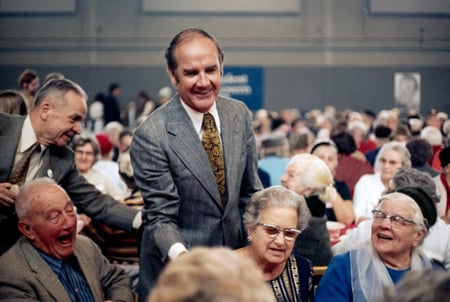When President Franklin Roosevelt came into office in the depth of the Great Depression, he sought to stabilize and empower American society by introducing bold new initiatives: Social Security, the Public Works Administration, the Federal Deposit Insurance Corporation, the Rural Electrification Administration, the Tennessee Valley Authority, the Civilian Conservation Corps, and the Agricultural Adjustment Administration, among many others. These measures were sufficiently successful, as was his leadership during World War II, that he secured four terms in the White House. There was some congressional resistance but not enough to block the support of both political parties.
Like Roosevelt, President Barack Obama has inherited a serious economic crisis, but in his first two years in office he has been met with an even worse problem: the rigid opposition of the rival party leaders to national health care and nearly every other proposal he has made. The Republican House Appropriations Committee has even voted to terminate public funding for NPR and PBS. Neither during my four years in the House of Representatives, when Dwight D. Eisenhower was in the White House, nor through eighteen years in the U.S. Senate, under John Kennedy, Lyndon Johnson, and Richard Nixon, have I witnessed any president thwarted by the kind of narrow partisanship that has beset Obama. He has tried to avoid such divisions by publicly explaining his willingness to compromise, but these gestures have been spurned. Some of his political critics have gone so far as to express the hope that the Obama Administration will fail, even avowing their determination to hasten that failure. What has happened, one is compelled to ask, to the love of nation?
I have learned that it is not easy to succeed either as a senator or as a president if you are pushing for fundamental change. We tend, as lawmakers and as citizens, to drift along with the familiar ways of thinking: If it is good enough for Grandma and Grandpa, it is good enough for us. If it is good enough for the flag-wavers and the boasters, it is good enough for us. Such resistance to change often is strengthened by powerful interests—nowhere more forcefully than in the National Defense bill that Congress considers and passes each year.
When I entered the U.S. Senate in 1963, the defense budget was $51 billion. This was at a time when our military experts felt it necessary to have the means to win a war against the combined powers of Russia and China. Today we have a military budget of over $700 billion, and yet neither Russia nor China threatens us, if indeed they ever did. Nor does any other nation. Furthermore, the terrorist threat we face is not a military matter. The World Trade Center was brought down not by artillery or bombers or battleships but by nineteen young Arabs equipped only with box cutters. The Department of Homeland Security created by the Bush Administration after this attack is a better instrument against terrorism than our military, even though our armed forces are the best in the world.
In my career both in the House and in the Senate, inspired by the words of Eisenhower, my supreme commander in Europe during World War II, I tried hard to curb the powers of what Eisenhower, in his farewell address as president, referred to as the “military-industrial complex.” Needless to say, all my efforts to reduce military spending were defeated. With the renaming of the War Department as the Defense Department in 1947, the military part of the government became sacred, virtually untouchable. How could anyone vote to cut defense unless he or she is willing to face political defeat?
We need a new definition of “defense” that takes into account the quality of our education, the health of our people, the preservation of the environment, the strength of our transportation, the development of alternative fuels, the vigor of our democracy. These were the concerns expressed by the people who stood in Cairo’s Tahrir Square holding up their signs for more than two weeks this winter. Without guns, knives, or the use of their fists, they brought down the dictator who had exploited them for nearly thirty years.
All Americans want their country to have an adequate military defense. But under pressure from corporate lobbyists and legislators seeking military contracts or bases for their states, we are spending to excess while other sources of national defense, such as health care and education, are shortchanged and the national debt grows ever larger.
Many patriotic Americans have opposed the two wars our gallant young troops have been asked to fight in Iraq and Afghanistan. Nobel Prize–winning economist Joseph Stiglitz has estimated that the direct and indirect costs of the Iraq war will amount to $3 trillion. This represents nearly a quarter of our national debt. I suspect that the war in Afghanistan will eventually cost another $3 trillion and we still will not have achieved our aim. General David Petraeus, the commander of U.S. forces in Afghanistan, advises that we cannot think of withdrawing our troops before 2014. If we stay on that schedule, our soldiers will have been fighting, bleeding, and dying there for thirteen years—more than three times the length of U.S. involvement in World War II.
I recently conferred with President Obama in his White House office, urging him to withdraw from Afghanistan. I’m pleased that he has since announced the withdrawal of 10,000 troops in 2011 and 23,000 in 2012. I would have been even more pleased if all our 100,000 troops now in Afghanistan, as well as those in Iraq, were on the way home.
The president may be reluctant to follow the advice of a presidential candidate who in 1972 lost forty-nine states to Richard Nixon. I can appreciate that concern. On the other hand, shortly after the 1972 election, two bipartisan investigations—one by the House and one by the Senate—forced the incumbent who beat me to resign his office in disgrace. A question from the New Testament comes to mind: What doth it profit a man if he gains the whole world or wins a big election and loses his own soul? The late Sargent Shriver, my running mate in 1972, came to me the day after the election and said, “George, we may have lost fortyine states but we never lost our souls.”
With this sentiment in mind, I would like to suggest a few bold steps President Obama might consider for the good of his soul and that of the nation.
1.
We should bring our troops home from Afghanistan this year. No previous foreign power that has tried to work its will in Afghanistan has succeeded—not Alexander the Great, not the Mongols, not the British, and not the Russians, who, after nine years of fighting, had sent some 25,000 of their soldiers home in coffins. The Soviet treasury was emptied and the Soviet Union collapsed. Even if it were desirable for us to stay a decade more, we simply cannot afford to do so.
2.
We should close all U.S. military bases in the Arab world. American troops in the Middle East incite rather than prevent terrorist attacks against us. We would do well to remember that when Osama bin Laden returned to Saudi Arabia after fighting the Soviets in Afghanistan, he found a large American army in his home country, positioned there to halt a possible Iraqi invasion—a presence that so offended him he denounced the king and his own family for quartering the American “infidels” within the shadow of the holy cities of Mecca and Medina. He then returned to Afghanistan to organize Al Qaeda and, later, launch the World Trade Center and Pentagon attacks.
3.
We should evaluate whether it is necessary to continue other American troop consignments to Europe, South Korea, and elsewhere. When the U.S. Army was sent to Korea in 1950 the deployment was described as a brief police action, but sixty years later our troops are still there. South Korea is now a wealthier, more populous, and more industrialized nation than North Korea, and is fully capable of defending itself. Similarly, U.S. troops in Europe, now numbering 80,000, have been there for half a century. They should be withdrawn, as were the Soviet forces from Eastern Europe under Mikhail Gorbachev.
4.
President Obama should call on the Pentagon to reduce the current military budget of $700 billion—a figure that accounts for almost half of the world’s military expenditures—to $500 billion next year, and then, over the next five years, to $200 billion. In a careful and persuasive study, Lawrence Korb, a senior fellow at the Center for American Progress and an assistant secretary of defense under Ronald Reagan, identifies unneeded and costly programs that could be cut from the Pentagon budget without weakening our security, including the elimination of sophisticated warplanes—all of which, added up, could save a trillion dollars over the next ten years.
5.
The Bush tax cuts for those with higher incomes should be not only repealed but reversed; with an increase in taxes for this bracket, the increased revenues could be used to reduce the national debt. There would, of course, be strong resistance to ending the tax favoritism now enjoyed by the rich, but this bonanza for the few at the top must end.
6.
Savings in military spending could be used to launch valuable public investments, thereby creating jobs and stimulating the entire economy. The administration has expressed support for creating a European-style high-speed rail system in the United States, and indeed we ought to build the fastest, cleanest, and safest passenger- and freight-train system in the world.
The president should also revive the full provisions of the World War II–era G.I. bill, which enabled 7.8 million soldiers to secure a college education at government expense while also receiving a cost-of-living stipend. Having been a bomber pilot during World War II, flying missions over Nazi Germany, I was one of the beneficiaries of the bill, eventually earning a Ph.D. in history at Northwestern University. This program was costly, but the government certainly made its money back, because educated citizens earn more and so pay increased taxes. Now, as we experience a crisis in higher education caused by soaring tuition costs that exclude many working- and middle-class young people, why not offer government-paid higher education and vocational training for all qualified students—both civilian and military?
Another wise public investment would be the expansion of Medicare to all Americans. Some of the recently proposed health-care legislation has been so lengthy and complicated that I am not sure what is contained in it, but we all know what Medicare is. We could reduce the impenetrable legislation to a simple sentence: “Congress hereby extends Medicare to all Americans.” I am at a loss as to why an old codger like me benefits from Medicare while my children and grandchildren do not. To soften the impact of this expansion on the budget, I propose that the program be implemented in steps every two years: the first step including children up to the age of eight; the second, those from nine to eighteen; the third, those from nineteen through thirty; and finally, those from thirty-one through sixty-five. Programs such as Medicare have been in place for years in many advanced countries. My Canadian relatives tell me that any government that tried to do away with their comprehensive medical and hospital care would be promptly expelled from office.
None of this is intended as a criticism of Barack Obama, who had my support when he was a candidate for the United States presidency and who has my support today. I hope that some of the ideas here might help him on the road to greatness. I wish him well on the journey ahead.





































































































